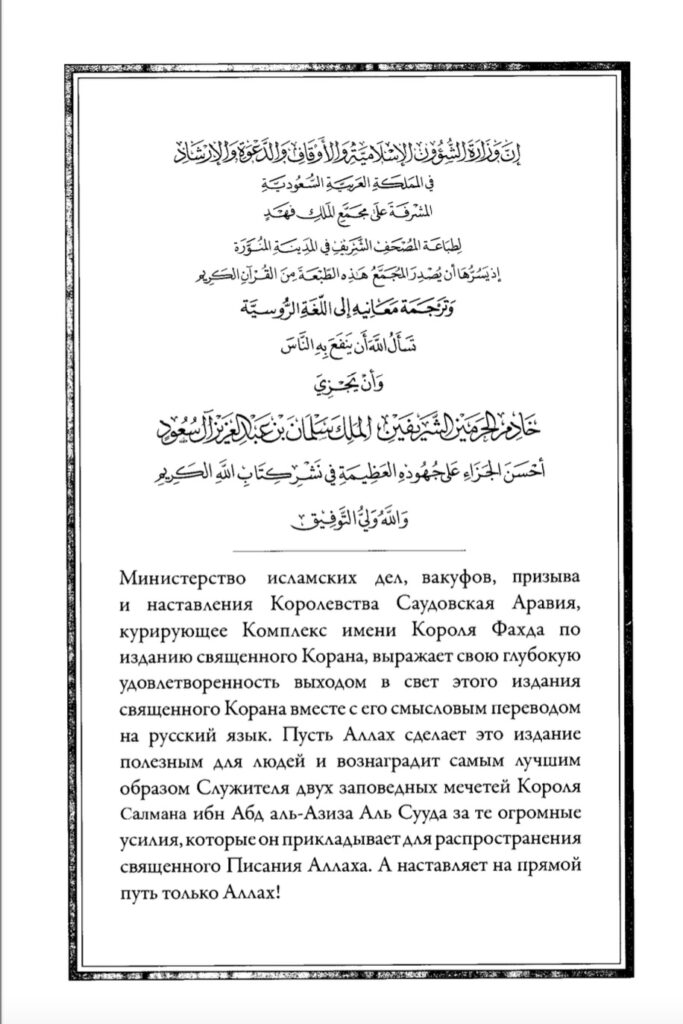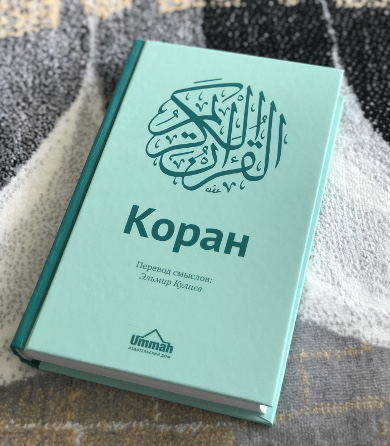If an ordinary Muslim for whom Russian is the mother tongue were asked today to recite Sūrat al-Fātiḥa from memory, it is very likely that their recitation would be based on Elmir Quliyev’s translation of the Qur’an. The ubiquitous presence of this Qur’an translation in print and online apps, and on peoples’ tongues, reflects the fact that no fewer than fifty editions and reprints have appeared since its initial publication in 2002, in Russia and beyond. Dr Elmir Quliyev (b. 1975) is an Azerbaijani translator, Islamicist, and public preacher of Islam. Born in Baku during the Soviet era, he studied dentistry in the nineties, and it was during his time at university that his life took a transformative turn when he developed the profound interest in Islam that was to shape his subsequent life trajectory. Despite having no formal training, Quliyev’s rigorous pursuit of self-study led to his mastering the Arabic language, which in turn led him to publish his Qur’an translation. His translation became extremely popular, not only among lay Muslims but also with some Muslim clerics associated with the Russian state, a number of whom, such as Mufti Ravilʹ Gaĭnutdin, even utilized it in their preaching activities. Despite its positive reception and popularity, this translation has become infamous for being involved in a high-profile legal case in Russia, as it allegedly contains extremist content. In this thread, we will first examine the factors that contributed to the popularity of this work and then turn to the court case that was connected to it.
Many factors came together to influence the spread and wide recognition of Quliyev’s translation, which appeared at the beginning of the millennium, more than ten years after the fall of the USSR. It is important to point out that prior to Quliyev’s translation there were already had a few notable Russian Qur’an translations available, among them two specific publications that became the subjects of public debate. In her poetic translation, Valerii͡a Porokhova highlighted the significance of her Muslim background, which she believed should be considered as an important qualifying factor for translators of the Qur’an. The marketing of Magomed Nuri-Osmanov’s translation, which was undertaken by a Daghestani philologist, likewise benefited from the author’s Muslim name. However, his translation had a very different objective to Porokhova’s, and aimed to produce an academic work that combined various theological perspectives and discourses within a single publication. Both of these works had their readerships, however, for many young Muslims the poetic approach taken in Porokhova’s translation, and what was seen as the fusion of various sectarian perspectives in Nuri-Osmanov’s, were viewed not as advantages but as signs of weakness and the works were perceived as lacking an ‘authentic’ grounding.

Quliyev’s translation, titled Svi͡ashchennyĭ Koran: Smyslovoĭ Perevod na Russkiĭ I͡azyk, emerged in 2002, during a time when the Salafi influence was at its peak, and the fact that it was approved and published by the Saudi King Fahd Glorious Qur’an Printing Complex (KFGQPC) reinforced its credibility among the younger generation of Russian-speaking Muslims. The style of language used by Quliyev was mostly clear, devoid of archaisms and easily comprehensible. It has an unusual feature that is not often present in Salafi-oriented translations, in that Quliyev quite frequently provides alternative translations in brackets, ever since the early editions. For example, in his rendition of Q 56:29, ṭalḥ is translated as ‘bananas,’ but Quliyev also includes ‘acacia’ in the brackets as a possible alternative translation; he goes as far as to provide three possible meanings for muhl in Q 70:8, where is translated as ‘molten metal,’ followed by the alternative readings of ‘oil residue’ and ‘bloody pus’ in brackets. This is quite rare for KFGQPC translations, as the Salafi translation paradigm aims to provide certainty for readers and generally avoids a plurality of interpretations.
The commentary explaining the verses included in Quliyev’s translation is drawn from mainstream Sunni ḥadīth traditions and ‘Salafi-approved’ mufassirs such as the medieval Ibn Kathīr and the contemporary Saudi commentator al-Saʿadī, and there is no evidence of the author’s personal voice in the commentary itself or in terms of any sectarian position. Quliyev has subsequently also translated al-Saʿadī’s tafsīr into Russian, and the classical ḥadīth collection Bulūgh al-marār by the medieval scholar Ibn Ḥajar al-ʿAsqalānī, as well as producing many other translations and monographs. His Qur’an translation adheres to today’s common maxim that a translation of the Qur’an does not represent an ‘exact’ translation of the Qur’an but is only the ‘translation of its meanings.’ While translation is always a process of interpreting and shaping the meaning of the original text, this is one of the ways in which modern Muslim translators and publishers try to emphasize the sacredness and inimitability of the original Arabic scripture. Quliyev adopted this convention, which had been popularized by various Muslim publishers involved in Qur’an translation activities, and hence ‘standardized’ his work. Another significant factor was that Quliyev did not represent the old generation of post-Soviet ‘mullahs’ who lacked credibility and were not seen as relatable by the youth. Instead, Quliyev was representative of the post-Soviet generation of ethnic Muslims who did not belong to the Soviet religious clergy. His persona was seen as an example of someone who had reconnected to Islam and played a pivotal role in spreading the Qur’anic message as a daʿwah, especially among those in the post-Soviet space for whom Russian was their mother tongue.

The longevity of the success of Quliyev’s translation went hand in hand with the second Chechen war and increased securitization of Islamic discourse in Russia. In this context, the terms ‘Wahhabism’ and ‘Salafism’ became general terminology that lacked an explanatory function but were used as signifiers of radicalism and extremism. This interpretation was not solely dictated by the state but was also reinforced by newly emerged post-Soviet pro-Sufi leaders in the North Caucasus, specifically in Daghestan, who were incorporated into local state structures. They reinforced the state securitization discourse and incorporated these signifiers in service of intra-Islamic polemics. In this context, Quliyev’s popular, Saudi-supported Qur’an translation became a part of this axis of contestation. The decision by a court in the Russian city of Novorossiysk in 2013 to ban Quliyev’s Qur’an translation became symbolic of Russian censorship activity, which encompassed a variety books, including a large number of diverse Muslim publications (some of which were other translations and books by Quliyev). The law ‘On Counteracting Extremist Activity’ was passed in 2002, and encompassed a full list comprising various types of literature, however, the presence on it of Qur’an translation became an issue that was widely discussed in the public domain. Many religious figures, scholars and official institutions criticized the decision to include Quliyev’s translation, seeing it as not necessarily anti-extremist, but rather as a representation of anti-Islamic policy in general. The impact of its inclusion on the official list has endured, and while the translation continues to be popular and much used, it has acquired the reputation of being a Salafi-oriented text. Another, very different but important aspect of the story behind this translation can be seen in the way that the translator’s personal spiritual and intellectual trajectory is reflected in the numerous reprints and editions of Svi͡ashchennyĭ Koran. While public discourse and critics usually view translations as fixed entities, for Quliyev his translation has become a life-long project which in many ways reflects his personal journey in education and the progression of his own personal ideas and views.
Elvira Kulieva
